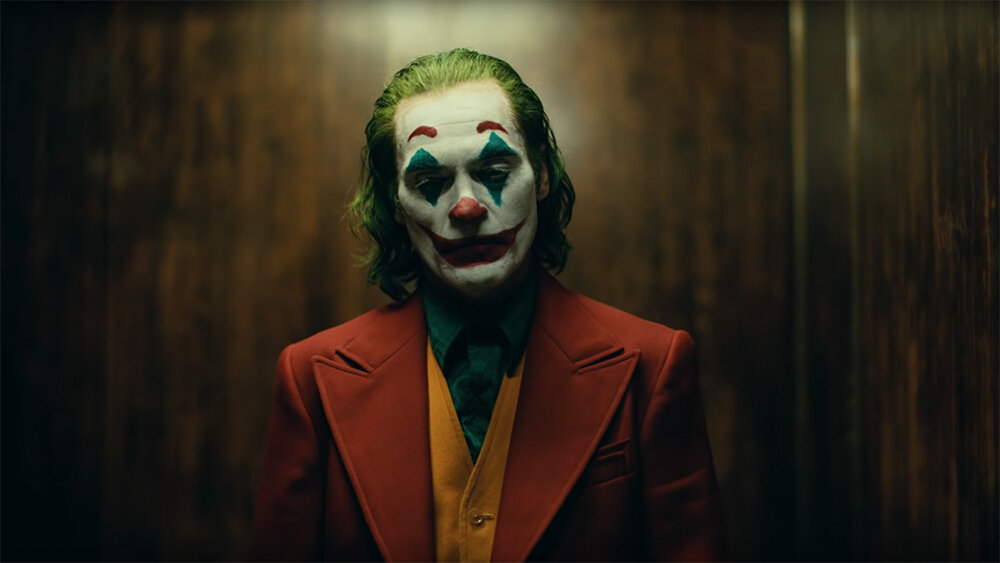Seasoned comic readers may remember DC Comics’ Elseworlds imprint, described as being stories where “…super-heroes are taken from their usual settings and put into strange times and places - some that have existed, and others that can't, couldn't or shouldn't exist. The result is stories that make characters who are as familiar as yesterday seem as fresh as tomorrow.” Angry, but artful, and featuring a riveting lead performance, Todd Phillips’ Joker again shows the elasticity of the superhero genre. Here, the character of the Joker is placed in a world that could exist right outside our door. There are no superheroes or other science faction/fantasy contrivances to save us, and the downtrodden only ever get trampled.
Joaquin Phoenix, who has a gift for playing broken disheveled outsiders, is the emaciated, impoverished, and mentally ill Arthur Fleck. Scraping by as a professional clown, Fleck is a magnet for bullies, especially considering there’s not much to laugh at in grimy early ‘80s Gotham City. Fleck dutifully takes care of his decrepit mother (Frances Conroy) in their ramshackle apartment, but he dreams of a better life as a successful standup comedian. Fleck admires the Johnny Carson-esque Murray Franklin (Robert DeNiro) and watches him on TV every night, fantasizing about the comedian as a sort of father figure that he’s never had. He’s also interested in Sophie (Zazie Beetz), the single mother that lives down the hall. Political and social turmoil make the city feel like it’s on the edge of upheaval. The wealthy but out of touch Thomas Wayne (Brett Cullen) thinks he has the answers and announces a mayoral campaign. When the hapless Fleck finally pushes back against some tormentors, he inadvertently lights the fuse of a revolution. Small but significant supporting roles belong to Shea Wigham and Bill Camp as cops investigating some murders, Glenn Fleshler as a fellow clown, Leigh Gill as a kindly colleague, and comedian and podcaster Marc Maron as a TV producer.
Regardless of what you make of the film’s story and messaging, it’d be hard to argue that Phoenix doesn’t put in an absolutely captivating performance. His physical transformation into the spindly Fleck is impressive, his presentation of mental illness is humanistic, and his overall emotional journey is compelling. I particularly enjoyed his anguished involuntary laughing. Though Phillips and Scott Silver’s script is definitely interested in big concepts like wealth inequality and assorted moral ambiguities, it is decidedly character centric and Phoenix turns in a powerhouse performance. Speaking of the writing, it’s also interested in realism, more so even than what Christopher Nolan pursued in his Dark Knight Trilogy. However, instead of an epic story about a wealthy and privileged man with a huge physique and access to endless weaponry who beats up the underclass and the mentally unstable, we get a small-scale tale about a pitiable slight man who lives in squalor and who pushes back against the wealthy and the powerful. That all being said, Fleck is not a hero. The film treads morally gray waters and is resolute in portraying the lead as a complicated and tragic antihero. It’s easy to see what you want in the film, but I think Phillips and company are more interested in asking (provocative) questions than in giving answers.
The production design is impeccable. Period detail is fantastic with Gotham City’s look recalling the sleazy New York of ‘70s and early ‘80s exploitation cinema. Fleck’s apartment, the social worker’s office, and the clown locker room are dingy and drab, hammering home the squalor that the average person contends with on a daily basis. Phillips then contrasts this with the sets like the opulent movie theater and the gates of the Wayne estate, perfectly syncing with the film’s messaging. Perhaps the most memorable location is the steep stairs where Fleck performs his quirky dance and which also provides an interesting visual. Costume design is also noticeably detailed, assisting in the immersive period aesthetic. DP Lawrence Sher captures all these details while also composing some striking images, as well. Joker also features great music by composer Hildur Guonadottir. Haunting, melancholy, and graceful, it compliments the tone of the visuals while not overwhelming them.
The character of the Joker is archetypal and rife for various interpretations. Todd Phillips uses that to his advantage with last year’s Joker. Just like the character, I think the film is open to interpretation. Much more ambiguous than the typical licensed property, I found the film to be atmospheric, thematically complex, and massively engaging. The director may overplay his hand in a few spots, but my nitpicks are negligible in the face of the film’s many triumphs. Just to be clear, I think there is room for misplaced admiration of Arthur Fleck, but if that’s all you see, then I think you’re missing the point. In any case, I loved the film and found it to be topical and entertaining. Highly recommended for fans of Taxi Driver, Fight Club, and Nightcrawler.
Michael Cavender



